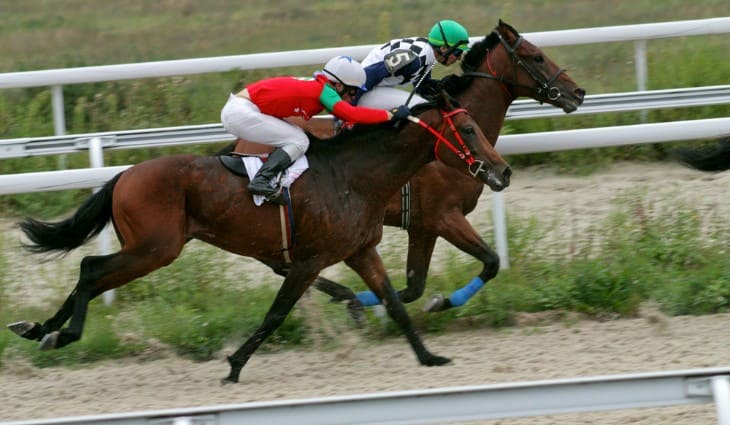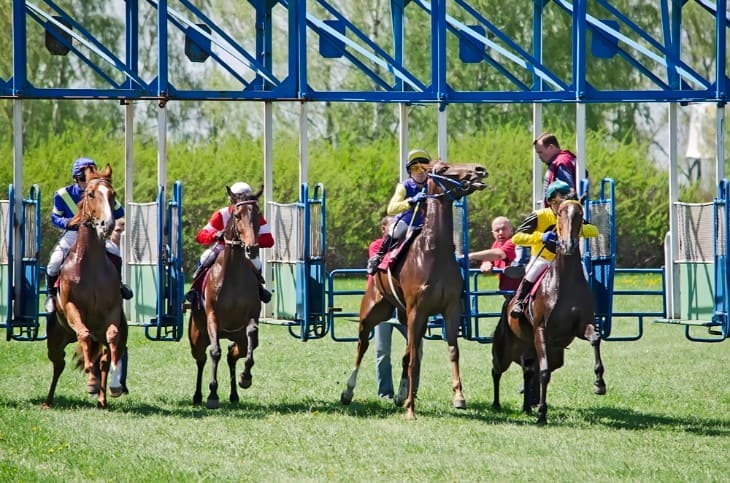- The Role of Assistant Trainers in Horse Racing
- Horse Racing Team Members
- What Assistant Trainers Do
- The Role of Assistant Trainers
- Head Trainers vs Assistant Trainers
- Why Conditioning Is Important In Horse Training?
- Nutritional Management by Assistant Trainers
- Involvement in Veterinary Care and Health Monitoring
- Role in Preparing Horses for Races
- Interaction with Owners and Stakeholders
- Professional Development and Career Progression
- Regulatory Compliance and Record-Keeping
- The Psychological Side of Horse Training
- Conclusion
The Role of Assistant Trainers in Horse Racing
Horse racing isn't only a game but an industry that employs numerous specialists, including jockeys, veterinarians, trainers, and stable workers. Each horse must be in perfect condition and trained in this high-stakes competition to maximise performance. Thus, horse racing acts as a laboratory for developing equine health and sports science and its entertainment value and contribution to the economy through gambling and tourism. Therefore, it is essential to understand the roles of the people who form this intricate ecosystem.
Horse Racing Team Members
However, all eyes focus on the jockeys and their mounts; yet, behind the scenes are dedicated personnel working nonstop towards racing day by preparing each horse. These officials consist of 'conditioners' or head trainers responsible for getting horses ready for races while veterinarians check on them, ensuring they are well before races. Stable staff like groomers and exercise riders matter much in maintaining a horse's daily routine.
Among other key participants in this field, the Assistant Trainer's role is usually belittled but very important. The assistant trainer works closely with the head trainer as he helps her in various activities such as preparation and care of racehorses.
The assistant trainer is a vital cog that links all other roles within a racing stable; hence, without his indirect guidance, there would be no progress in any camp. From taking good care of its body to providing nutritional diets to medical treatments, it effectively determines whether the horse will perform at its best during those few minutes at the racetrack. Thus, comprehending what the assistant trainer does becomes essential when one has to see how complicated it can be to prepare a racehorse.
What Assistant Trainers Do
Assistant trainers serve as pillars supporting winning stables. They help pass head trainers' instructions across divisions within teams, making sure information is understood as meant by relaying messages from these central figures directly down line staff. They are assigned multifaceted tasks that range from planning exercises to overseeing daily grooming and, in some cases, liaising with vets and other professionals. Dealing with horses requires the assistant trainer to be knowledgeable about horse behaviour, particularly since they will also coordinate effectively with different personnel. In certain situations, the head trainer may allow assistant trainers to train young or inexperienced horses, thus allowing them to participate in races.
Every morning before sunrise, when most people still sleep, an assistant trainer starts his day by monitoring the horse's morning exercise routines. They work closely with exercise riders, key personnel responsible for maintaining a horse's fitness level. Consequently, the assistant trainer must have sound knowledge of human and animal physiology for a horse's exercise program to coincide with its physical abilities while considering rider safety and well-being.
The Role of Assistant Trainers
- Beyond Orders: The duties of an assistant trainer go beyond merely executing the orders of the head trainer. These professionals are responsible for tasks significantly impacting the horse's well-being and race performance.
- Medical Monitoring: The assistant coach is responsible for health monitoring, working with veterinary staff to perform regular checks and treatments, and managing the horse's diet and feed supplements.
- Race Readiness: The assistant trainer plays a pivotal role in getting horses ready for the next race by designing a strategic training program for specific events.
- Training Modifications: Depending on the kind of race, the distance that will be covered, or even ground conditions, an assistant trainer might have to modify an exercise routine or change a horse's diet. All this requires an understanding of the horse's physiology and racing conditions.
- Post-race reviews: On many occasions, assistant coaches engage in post-race reviews, scrutinising how horses had formerly performed to pinpoint areas for improvement. Data collected in this process may include lap times and heart rates, which the head coach then uses to plan future training programs.
- Role Significance: An Assistant Trainer's role isn't strictly administrative or ancillary but combines practical skills with theoretical knowledge in equal measure.
- Acting Proactively And Insightfully: Being proactive involves taking the initiative rather than waiting for action while being insightful means having a deep understanding of why something needs to be done and how best to do it.
- Bedrock Of Triumph: The absence of an assistant trainer would make it next to impossible for a head coach to devote his energies to creating broader training strategies or talking to owners and racing officials, thereby making such personnel the cornerstones of any successful horse racing enterprise.
Head Trainers vs Assistant Trainers
The relationship between a head trainer and an assistant trainer is symbiotic because they must trust each other, communicate effectively and share common goals. In making overall decisions on training and racing strategies concerning particular animals, including their age groupings, form, and type(s) of races they entered into, however, usually falls upon the shoulders of the head trainer. Most often, though, implementation depends mainly on the assistant trainer.
The head trainer may be more visible and liaise with owners and other stakeholders, but the assistant trainer's input bridges this gap from theory to practice. In most cases, the associate trainers in stables provide feedback to their head trainers regarding a horse's condition, like its temperament or how it reacts to some training programs. For instance, in many stables, it is typical for an assistant coach to have daily discussions about any observations made with the head coach related to horses' behaviours, progress made so far and planning for future training.
This is not only a hierarchical relationship; it is a partnership. A good head trainer values their assistant's views and insights because they understand that these are voices of experience obtained through regular interactions with horses, thus vital for sound decision-making. A practical assistant must be able to report such findings openly while using his/her common sense to relate them beyond daily happenings.
Why Conditioning Is Important In Horse Training?
Physical conditioning is at the core of every racehorse's performance ability. Although nature determines the initial parameters of a horse's speed, stamina, or agility through genetics, meticulous training brings all these attributes closer to maximum realisation. The contribution of an Assistant Trainer towards this aspect cannot be underrated.
The physical fitness of a horse requires not only planning but also the implementation of several exercise programs. These can range from trotting and cantering to more intense gallop sessions. Assistant trainers and race conditions should oversee strength and agility drills, which should be simulated so the horse can get used to possible pressures on the day of racing. Thus, during these sessions, an assistant trainer should record the horse's performance thoroughly, track its recovery, and report any signs of tiredness, stress, or injuries.
Given the demands of horse racing, injury concerns will always exist. Assistant trainers ensure that every training program is customised according to the horse's physical capabilities while leaving enough time for recovery and repair. Overtraining may lead to burnout and injuries, whereas undertraining might cause poor race performance. Striking this balance is a subtle art that encompasses understanding what veterinarians say and what strategies head trainers implement.
Nutritional Management by Assistant Trainers
Just like human athletes need balanced diets to perform at their best, so do horses; as part of this role, an assistant trainer should design a feeding program that complements the training schedule. This ensures that a horse gets adequate muscle-building nutrients, recovery from exertion, and overall good health. Usually, assistance comes from veterinary officers and equine nutritionists who consider factors such as age, health status, and workload level, among other things, when deciding on diet compositions.
A properly managed diet plan could significantly impact a horse's energy levels, muscle recovery, and mental condition; some examples are carbohydrates, fats, proteins, vitamins, and minerals. This means that it is essential for the trainer to check if there are deficiencies or intolerances in response to feeding changes concerning weight coat condition behaviours, etc. If necessary, the feeding program may be adjusted in terms of timing and compositions of food items and supplements. It is an ongoing process that requires expertise as well as close monitoring.

Involvement in Veterinary Care and Health Monitoring
- Daily Health Monitoring: One key aspect of an assistant trainer's job is ensuring the good health and welfare of the racehorses he or she cares for. Monitoring a horse's health daily entails visual checks and working closely with veterinary experts for more comprehensive examinations and treatments.
- Symptom Detection and Intervention: Assistant trainers may notice an indication that racing horses are unwell, such as lameness, lethargy, or changes in eating patterns. Therefore, when such cases arise, immediate medical attention must be sought from veterinarians.
- Preventive Medicine: Assistant trainers have a role in preventive medicine after immediate care. This includes administering injections or supervising deworming procedures and other routine veterinary tasks. They also make sure that medical histories, including recurring conditions, are properly communicated to veterinarians and the head trainer.
- Psychological Well Being: Health monitoring goes beyond a horse's physical wellness to include its psychological state. Stress and anxiety can have extreme effects on the animal's general performance level, leading to physical symptoms. In other words, assistant trainers should be able to interpret body language distress signals to prevent mental imbalances during sports activities.
- Primary Healthcare Manager: Fundamentally, an assistant trainer acts as the primary healthcare manager for racehorses. In regard to both immediate care requirements and long-term statuses, there should be close coordination with veterinarians. Hence, this position necessitates having wide knowledge about equine health care issues plus paying much attention even to minor details whenever any crisis arises.
Role in Preparing Horses for Races
Preparing a horse for racing is not only about training but also encompasses other factors like nutrition intake. It, however, requires an all-encompassing approach that considers the specific challenges anticipated during these races, such as track surfaces, among others. Assistant trainers are the ones responsible for this stage since they implement what has been planned by the team leader and make decisions based on real-time observations and experiences.
The assistant trainer may introduce A race-specific training schedule weeks or even months before the competition. Such programs may involve stamina-boosting exercises for longer races or speed drills for shorter sprints. Furthermore, the horse's mental preparation needs a lot of attention from the assistant trainer because they have to figure out how best to make the animal manage stress levels in a racing environment, such as crowd noise, other horses, and getting there.
The assistant trainer must also comply with all administrative and regulatory requirements. These include checking entries, handling transport logistics, and ensuring that all relevant health checks and documents are completed. This is an important part of ensuring everything runs smoothly on race day; failure can lead to disqualification or penalties.
Interaction with Owners and Stakeholders
Assistant trainers often act as intermediaries between racehorses and various people involved in racing, such as owners, vets, legal bodies, etc. Despite high-level interactions mainly done by head trainers, their assistants usually provide them with key information and updates that inform these conversations.
Assistant trainers, therefore, work closely with owners by keeping them updated about the progress made while vets can keep track of health conditions, whereas regulators will require compliance documents; thus, assistant trainers will rely on them when reporting behind-the-scenes information regarding fitness and healing progress so far experienced.
Owners, particularly those lacking knowledge in horse training and looking after them, depend on the assistant trainer for regular updates. Assistant trainers must be skilled in breaking down complicated equine health and training issues into language non-specialists can comprehend. A good deal of verbal communication skills, as well as discretion, is required since there are times when sensitive information, such as a case of injury, performance decline or modification of strategy, has to be disclosed.
Media interaction with the assistant trainer might also be required, especially if a horse is doing quite well or is going to participate in a high-profile race. Prudence and professionalism matter here because any statement made to the media could tarnish the stable's reputation, including the head trainer and even the actual horse.
Professional Development and Career Progression
Thus, an assistant trainer role often leads to becoming a head trainer; however, it entails broad skill sets and deep specialisation, making it unique. In such positions, continual professional development is essential. This can involve formal studies in equine science, apprenticeship programs or practical experience working under some accomplished trainers. Asant trainers should also take time to discover new findings concerning equine healthcare techniques, training methodologies, and technological innovations like novel training gears or software.
Networking is also essential for career growth; assistant trainers should interact with professionals within and outside their immediate work environment, including veterinarians, farriers, and nutritionists, among other trainers. Learning opportunities at industry seminars, workshops, and races can also facilitate career advancement.
Certification from recognised organisations dealing with horses can add credibility to an individual's resume and may be a prerequisite for higher positions or top stables. Like all professions, mentorship from experienced trainers will give one invaluable insight, thereby paving the way towards more advanced job titles within this line of duty.
It should not be thought that the assistant trainer's role is static; rather, it offers dynamic progression paths and specialisation. This is a diverse field that continuously calls for learning and development, whether one wants to become a head trainer or specialise in one area of horse care.

Regulatory Compliance and Record-Keeping
The horse racing industry is highly regulated to guarantee the welfare of animals and the integrity of the sport. Complying with these rules is not only advisable but mandatory. Therefore, Assistant trainers are vital in ensuring that every part of stable activities acts according to regulations set by regulatory bodies like the British Horseracing Authority in the UK. This includes the administration of drugs, treatment protocols, or simply shifting horses from racing sites.
Record keeping is an integral part of regulatory compliance. Every administration, training session, and veterinary examination must be recorded accurately. These records serve several purposes, including being useful tools for tracking the animal's history and performance and indicating compliance during inspections or inquiries.
Simplistic failures to maintain accurate records or conform to regulations can result in severe penalties like fines, suspension and even ejection from business operations. As a result, the assistant trainer must be conscientious and well-organised in maintaining records and ensuring the training of all members of staff on compliance requirements. The associate trainer frequently interacts with compliance officers and, during audits and inspections, is the initial contact person.
The Psychological Side of Horse Training
Physical condition and health are essential considerations in horse racing, but a little-discussed yet critical part of training and performance is the psychological wellbeing of the horses. Horses have unique characteristics, just like humans. Some may naturally be more anxious, aggressive, or stubborn, which significantly affects their race performance. The assistant trainer is instrumental in appreciating these traits and implementing mechanisms to control them.
Behavioural training techniques may vary from desensitisation practices for nervous horses to assertiveness training for less dominant ones. Even familiarising a horse with the starting gate can constitute a psychological exercise. In some cases, horses may require professional behavioural assessments and interventions from veterinarians specialising in equine behaviour.
Understanding horses' psychological profiles can inform other areas of their management as well. For instance, a nervous horse might need a different nutritional strategy than a relaxed one. Similarly, physical training sessions could be approached differently depending on whether they are designed for particular types of horses or not; this ensures that stress is minimised so that it doesn't adversely affect performance.
Conclusion
Assistant trainers' role in horse racing covers various tasks beyond racetrack, hence being complex, multifaceted roles. Assistant trainers participate actively in hands-on duties such as training and nutrition, among others, while at the same time taking care of the animal's welfare before races begin. They also have responsibilities beyond doing things within barn walls; they are critical intermediaries between owners, veterinary professionals and regulatory agencies, among others, who run stable activities. They execute what the head trainer says and, at the same time, use their thoughts that have been derived from close interaction with the horses on a daily basis.








